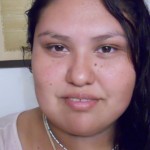Fluency
By Royce K. Freeman
I used to be fluent.
Still dream sometimes in my Native tongue.
My mother tells me I would talk Hidatsa in my sleep,
still do…
just soft murmurs that even I don’t understand today.
(Sounds like) Maut-zeh-vah… Maut-zeh-vah… Maut-zeh-vah geetz.
Shhhhh. Come here.
Many nights, I would dream of running through tall grass talking to insects at my feet.
Speaking words I didn’t know English translations for.
But they felt right.
Still feel right.
Maybe I would be fluent today,
one of the few fluent Hidatsa speakers in my father’s tribe,
like my father’s mother.
But I was robbed of that chance—
grandma hushing me back to sleep
between the alcohol and drugged rages
that consumed our kitchen,
our living room… our bedroom… our lives.
(Sounds like) Maut-zeh-vah… Maut-zeh-vah… Maut-zeh-vah geetz.
Shhhhh. Don’t say anything, just close your eyes.
Maybe, I’d be fluent today if my mother had not valued her life
and the lives of her two baby girls,
always hiding in the closet
as our father broke our home—
as he broke our spirits.
She fled,
on a cold winter night.
Maut-zeh-vah… Maut-zeh-vah… Maut-zeh-vah geetz.
That’s what I have left of my fluency.
But I have my life
my sister
my mother.
Maybe, I say…
maybe, does that count?
“Fluency” was previously published in Yellow Medicine Review: A Journal of Indigenous Literature, Art, and Thought, Spring 2012.
_________________________________________________
 Royce K. Freeman is an Eastern Shoshone and Mandan-Hidatsa writer, scholar, and mother of two beautiful boys. She was raised on the Wind River Reservation in Wyoming and attended the St. Labre Indian School in Montana. She most recently finished her Master of Arts degree in Native American Studies and is currently a doctoral student studying Sociolinguistics in the Department of Anthropology at the University of Oklahoma. She is a fierce believer in the power words have to honor, entertain, educate, heal, inspire, and unite. Her poetry and scholarly work flow from her experiences as a Native woman, the strength of her family and culture, and her life as a survivor and descendent of Indian boarding school intergenerational traumas. The feelings of risk and urgency feed and shape her writings. The risks of sharing hushed and hidden experiences are constant challenges, but there is an urgency to share words that say we are not alone in this, nor in our needs and hopes for betterment.
Royce K. Freeman is an Eastern Shoshone and Mandan-Hidatsa writer, scholar, and mother of two beautiful boys. She was raised on the Wind River Reservation in Wyoming and attended the St. Labre Indian School in Montana. She most recently finished her Master of Arts degree in Native American Studies and is currently a doctoral student studying Sociolinguistics in the Department of Anthropology at the University of Oklahoma. She is a fierce believer in the power words have to honor, entertain, educate, heal, inspire, and unite. Her poetry and scholarly work flow from her experiences as a Native woman, the strength of her family and culture, and her life as a survivor and descendent of Indian boarding school intergenerational traumas. The feelings of risk and urgency feed and shape her writings. The risks of sharing hushed and hidden experiences are constant challenges, but there is an urgency to share words that say we are not alone in this, nor in our needs and hopes for betterment.




4 Comments